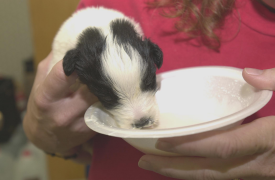 I love red meat. I love steak, and bacon, and ribs, and sausage, and burgers, and gyros, and chili, and pulled pork barbecue. I love a sub sandwich with whatever I want on it. I love pho tai.
I love red meat. I love steak, and bacon, and ribs, and sausage, and burgers, and gyros, and chili, and pulled pork barbecue. I love a sub sandwich with whatever I want on it. I love pho tai.
We Americans love red meat as a culture, too. We’re a bit persnickety about the animals we’ll eat, though. We generally recoil at the thought of eating horse meat, for example. But it’s eaten in a lot of the world, and actually rather commonly in many places. We don’t eat dog or cat meat, but they’re part of several Asian cuisines. (If you’re spooked by that thought, don’t ever look it up on Wikipedia, by the way.)
In the United States and many other places, it’s taboo to eat what we consider to be companion animals. The horse, the dog, and the cat are all sufficiently capable of thought, and even rudimentary emotion, to bond with us. We can make close friends with them. We don’t eat our friends.
Oh, and did you know pigs are smarter than all of them?
Oops.
If I’m eating an animal that is smarter than my dog, then what are my ethical and moral obligations to that animal when I raise it for food?
I know what it is to think. I know what it is to reason. If I can see any amount of convincing evidence of these traits in an animal being raised for slaughter, then I think I owe it enough humanity to give it a reasonable life. I owe it an environment in which it can naturally parent, not a living death in a farrowing crate. I owe it an environment in which it can enjoy its mother’s milk, not its peers’ blood.
You don’t have to be an ultra-leftist wacko to be repulsed by factory farming. Are you getting that yet?
“I think using animals for food is an ethical thing to do, but we’ve got to do it right. We’ve got to give those animals a decent life, and we’ve got to give them a painless death. We owe the animal respect.” – Temple Grandin

I first encountered an article about Dr. Temple Grandin maybe ten years ago. She has studied livestock behavior extensively, and her web site (linked in the previous sentence) is a treasure trove of research and design she’s undertaken. She’s done things like design slaughterhouses and corrals with gently curving paths, so that cattle cannot see what awaits them. Go spend some time there. This is a remarkable person.
During my Lenten vegetarianism, and particularly toward the end of it, I considered what behaviors I might be able to sustain long-term. Going vegan is out of the question. I think I learned during those 46 days that staying vegetarian isn’t something I’m ever going to do, either.
But could I eat just seafood (pescatarianism)? I tried that for a month once. I could keep a sushi outing and my favorite shrimp, but I’m not sure I could do it indefinitely.
What about just seafood and poultry? That seems a little more doable. That doesn’t complicate Thanksgiving. I could still have the habanero wings at Cricket’s. Turkey bacon.
I think I’m mostly headed for that. Actually what I’d say is “I don’t habitually eat mammals.” That still green-lights me for the alligator appetizer of which we’re so fond at The Original Oyster House, or the occasional frog legs.
I would make exceptions when I was reasonably sure how an animal had lived before it got to my plate. When I get rigorous about locally sourced and cruelty-free meat this summer, I could see myself buying some pork from my stepbrother when he buys a pig, when he knows the farmer and how the pig lived and died. I could see myself purchasing bison meat from a farm that uses a sniper rifle to slaughter its animals.
There are lots of experiences that would be totally shut down for me, though. I could never order beef or pork in most restaurants again. (That’s a lot of favorite entrees crossed off.) Could I get by indefinitely? With poultry and seafood remaining green, I think I could.
Think about your favorite dog or cat, whether this is a living animal or one in your fondly-remembered past. Are you all right continuing to habitually eat animals with even larger mental capacities, when you can reasonably assume they haven’t lived decent and considerate lives?
You might also like:
- BoWilliams.com On Dominion Over Animals, Part I: Deception in Degree
I introduced this post series last week. And now I’m going to give you something of an extended intr… - BoWilliams.com On Dominion Over Animals: Introduction
I read a remarkable opinion piece several months ago that has since had me thinking every day about … - BoWilliams.com On Dominion Over Animals, Part VII: Too-Convenient Principle
So the past two weeks have been about buying animals and animal products with consideration given to… - BoWilliams.com On Dominion Over Animals, Part VIII: Takeaways
Tonight ends my Dominion Over Animals post series. I’m stopping at eight installments. Could have do… - BoWilliams.com On Dominion Over Animals, Part V: Chickens and Eggs
When we start talking about animals, our relationships with them, and our responsibilities to them, …

This is one of the most difficult quandaries we face in our society. I have told the story before about talrestaurantomeone who grew up on a hog farm in NC and how the hogs would cry on slaughter day. Factory farming is an abomination, but has become the way we receive our food. It’s not just grisly, but also has become unhealthy for us, what with the hormones and antibiotics used.
I rarely eat read meat or pork at home, but like you hate the thought of never ordering a steak again at a restaurant. It is definitely something to think about. If there’s tuna or salmon, that’s a good substitute. Trout too.
Kudos to you for making a switch.
Thanks, Cheryl, but I’ve just taken a few steps down the path. I expect I’ll always think of it in terms of trade-offs. I’ll never be consistent enough to please lots of people.
Funny you mention Temple Grandin, I’m currently reading her book The Autistic Brain. Engaging woman.
It’s on my “do this sooner rather than later plan” to get a chest freezer and buy all of our meat locally. I’d like to switch to local eggs too, it’s not like we go through them all that quickly that the extra cost is insurmountable. Eating out is the conundrum. I’d love to only eat at restaurants which source their ingredients locally and sustainab-ly, but I also want to support local small businesses, many of which can’t afford to do so. I end up muddling around in the middle. Ironically, I eat more meat when I eat out than we do at home because cooking meat takes more time/effort. To really make a difference I would need to flip that. Still percolating.
Eating out in any sort of conventional way becomes basically impossible if you take a hard line. I understand it being difficult to navigate.